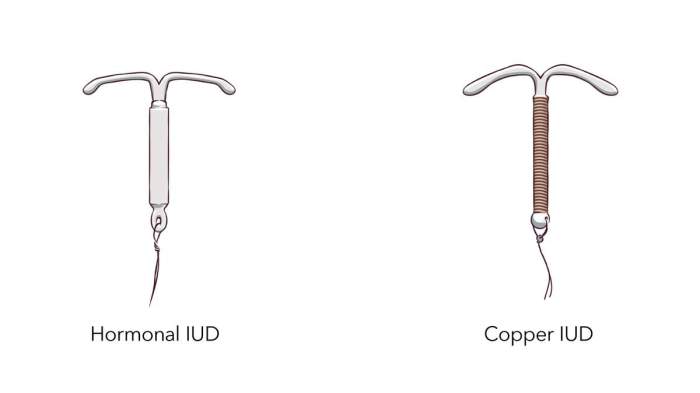
Embark on a journey through the differences between Contraceptive Implants and IUDs, exploring how these contraceptive methods work and their impact on reproductive health.
Discover the effectiveness rates, insertion process, side effects, and more in this insightful comparison that sheds light on the world of birth control.
Contraceptive Implants vs IUD
Contraceptive implants and IUDs are both highly effective forms of birth control, but they work in different ways. Implants are small rods inserted under the skin that release hormones to prevent pregnancy, while IUDs are T-shaped devices placed inside the uterus to prevent sperm from reaching the egg.
Effectiveness Rates
- Contraceptive implants are over 99% effective in preventing pregnancy, making them one of the most reliable forms of birth control available.
- IUDs are also over 99% effective and have the advantage of lasting for several years without needing to be replaced.
Insertion and Removal Process
- Inserting a contraceptive implant involves a minor surgical procedure where the rod is placed under the skin of the upper arm. Removal is also a simple procedure that can be done in a doctor’s office.
- Inserting an IUD is a quick procedure done in a healthcare provider’s office, and removal is just as simple. Both processes are generally well-tolerated by most individuals.
Side Effects
- Common side effects of contraceptive implants may include irregular bleeding, headaches, and weight gain. Some individuals may also experience acne or mood changes.
- On the other hand, common side effects of IUDs may include cramping, spotting between periods, and changes in menstrual flow. In some cases, there is a risk of the IUD becoming displaced or expelled.
Contraceptive Implants
Contraceptive implants are small rods that are inserted under the skin of a woman’s upper arm to prevent pregnancy. These implants release a steady dose of hormones into the body, primarily progestin, which works to prevent ovulation, thicken cervical mucus to block sperm, and thin the lining of the uterus.
Types of Contraceptive Implants
- Nexplanon: This implant is a single rod that can be effective for up to three years.
- Jadelle: Consists of two rods and can provide protection for up to five years.
Advantages of Contraceptive Implants
- Long-lasting protection: Implants can provide birth control for several years without needing daily attention.
- Highly effective: They are more than 99% effective at preventing pregnancy.
- Reversible: Fertility returns quickly once the implant is removed.
- Convenience: No need to remember to take a pill daily.
Common Misconceptions about Contraceptive Implants
- Some people believe that implants can cause weight gain, but studies have shown that any weight changes are minimal and not significant.
- There is a misconception that implants can lead to infertility, but fertility returns once the implant is removed.
IUD
When it comes to contraception, Intrauterine Devices (IUDs) are a popular choice among women for their effectiveness and long-term benefits.
Types of IUDs and Their Features
- The Copper IUD: This type of IUD releases copper ions, which are toxic to sperm, preventing fertilization. It can last for up to 12 years.
- Hormonal IUDs: These release progestin, thickening cervical mucus to block sperm and thinning the uterine lining. They can last between 3 to 7 years, depending on the brand.
Benefits of Using an IUD
- Highly effective: IUDs are more than 99% effective at preventing pregnancy.
- Long-term contraception: Once inserted, IUDs can provide contraceptive protection for several years.
- Convenience: No need to remember to take a pill daily or use a barrier method before intercourse.
Risks and Complications
- Perforation: In rare cases, the IUD can perforate the uterus during insertion.
- Infection: There is a small risk of infection, especially during the first few weeks after insertion.
- Expulsion: Sometimes the IUD can be expelled from the uterus, leading to a decrease in effectiveness.
Contraceptives, Birth Control, Reproductive Health

Contraceptives play a crucial role in promoting reproductive health by allowing individuals to make informed choices about their sexual and reproductive lives. They enable people to plan if and when to have children, ultimately leading to healthier outcomes for both individuals and families.
Various Methods of Birth Control
- Contraceptive Pills: Oral pills that contain hormones to prevent pregnancy.
- Condoms: Barrier method that also helps prevent sexually transmitted infections.
- Contraceptive Implants: Small rods inserted under the skin that release hormones to prevent pregnancy.
- Intrauterine Devices (IUDs): T-shaped devices placed in the uterus to prevent pregnancy.
Role of Contraceptives in Family Planning and Women’s Health
Contraceptives allow individuals to plan their families, ensuring that they can provide the necessary care and support for their children. They also give women the power to make decisions about their reproductive health, including spacing out pregnancies for optimal maternal and child health.
Impact of Access to Contraceptives on Public Health and Society
Access to contraceptives has been linked to lower rates of unintended pregnancies, maternal mortality, and unsafe abortions. It also contributes to economic empowerment for women and overall societal well-being.
- Reduces the burden on healthcare systems by preventing unintended pregnancies and related complications.
- Promotes gender equality by allowing women to control their reproductive choices.
- Improves education and economic opportunities for individuals by enabling them to plan their futures.
Closing Summary

In conclusion, the debate between Contraceptive Implants and IUDs offers a deeper understanding of contraceptive choices, emphasizing the importance of informed decisions for personal health and well-being.
Expert Answers
How do contraceptive implants prevent pregnancy?
Contraceptive implants release hormones that prevent ovulation and thicken cervical mucus to block sperm.
What are the advantages of using an IUD?
IUDs are long-term, reversible, highly effective, and require minimal maintenance.
Are there any common misconceptions about contraceptive implants?
Some misconceptions include that they can cause weight gain or affect future fertility, which are often unfounded.





